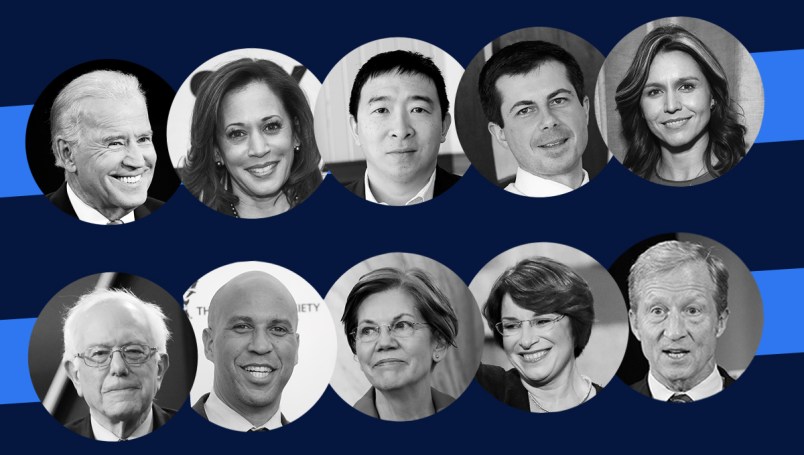On the heels of a day stuffed with explosive developments in the impeachment inquiry into President Trump, which produced positive returns for the Democratic party‘s impeachment effort, 2020 Democrats coalesced in Atlanta and highlighted the fractures in the party’s views on key issues.
The atmosphere of the fifth Democratic debate stage on Wednesday evening was remarkably more quaint and noticeably more jovial than previous debates. While candidates’ attacks on one another were direct and blunt, the 10 on stage voluntarily offered each other support on several occasions and even traded their fair share of lighthearted jabs.
But the moderators asked substantive questions, and a few key candidates were clearly more rehearsed than they’ve been in the past four parleys. Here are our key takeaways from the evening’s confab:
Impeachment, right out the gate
The first 12 minutes of the debate were laser-focused on the proceedings that dominated earlier in the day: impeachment. MSNBC host and debate moderator Rachel Maddow kicked things off by immediately quizzing Sen. Elizabeth Warren (D-MA) on whether she’d communicate her pro-impeachment views to her Republican colleagues if and when articles are sent to the Senate for trial.
“Of course I will,” Warren said, adding that her first move would be to ask Republicans to read special counsel Robert Mueller’s report — “all 442 pages of it.”
Sen. Bernie Sanders (I-VT) made similar remarks when faced with an impeachment question, before arguing America cannot “simply be consumed by President Trump.” South Bend Mayor Pete Bettigieg uttered similar platitudes and Sen. Kamala Harris (D-CA) bluntly declared “we have a criminal living in the White House.”
But all eyes were on former Vice President Joe Biden, who’s found himself at the center of the House’s impeachment inquiry over President’s Trump’s now-transparent efforts to get a foreign country to investigate his family. In a somewhat awkward delivery, Biden avoided responding to any specifics, simply stating he’d learned two things from the impeachment proceedings: that “Trump doesn’t want me to be the nominee” and “Putin doesn’t want me to be president.”
Warren faces questions about Medicare for All plan amid criticism
We were watching for this. About 20 minutes in, Warren was questioned about how she might respond to critics who believe her healthcare stance will cost her critical votes in the general election. Notably, she harped on how quickly she plans to implement her policies. Since Warren announced she would roll out her policy in two separate phases, she’s faced criticism from the left.
“Let’s get as much help to the American people as we can as fast as we can. On day one as president I will bring down the cost of prescription drugs of things like insulin and epipens,” she said. “And in the first hundred days I want to bring in 135 million people into Medicare for All at no cost to them.”
“And then in the third year when people have had a chance to feel it and taste it and live with it, we’re going to vote and we’re going to want to Medicare for All,” she added.
As many speculated, Warren’s rollout plan became a point of contention between Warren and her ideological ally Sanders. The moderator pivoted to Sanders, who pushed back, ever so politely on Warren’s proposal.
“In the first week of my administration we will introduce Medicare for All, Medicare for All that means no deductibles, no co-payments, no out-of-pocket expenses,” he said.
Warren defends her Medicare for All plan pic.twitter.com/Sm8b3ZpqNq
— TPM Livewire (@TPMLiveWire) November 21, 2019
Substantive line of questioning
The fifth Democratic debate had a more civil vibe and the candidates faced more substantive questions than usual from the panel — which was noticeably all female, a rarity. The moderators asked about more predictable topics like impeachment inquiries, but also pointed, policy-specific queries on issues like voting rights, abortion, the social safety net, the #metoo movement, and paid family leave.
The choice of candidates for specific questions was targeted as well. While not a novel quizzing approach, moderators appeared to target candidates with questions they’d likely be weak on. Biden was asked a pointed question about the #metoo movement, which holds substantial weight after multiple allegations surfaced earlier this year that he made women uncomfortable with his hugs and other touching. Warren was immediately asked about criticism of her health care plan, which many predicted would create a rift between her and Sanders. Steyer, a billionaire, was grilled about his wealth and Yang, often dragged for a superficial platform, was asked specifically what he would say during his first phone call with Russian President Vladimir Putin if elected president.
Buttigieg under fire
As Buttigieg surges in the Iowa polls and a single survey in New Hampshire, two candidates on stage took aim at the mayor, perhaps hoping to chip away at his recent momentum. After the mayor advocated for a pro-Democracy bill currently held up in the Senate, Klobuchar used the point to showcase her own experience handling such legislation. In response, the mayor pointed to the decades of “Washington experience” on stage and asked, “and where are we right now as a result?”
Tulsi Gabbard then went after Buttigieg for his recent comment that he would consider sending troops to Mexico to fight drug cartels. Buttigieg accused Gabbard of taking him out of context, then dinged her for meeting with Syrian dictator Bashar al-Assad. Gabbard responded by saying she would meet with “adversaries and friends.”



